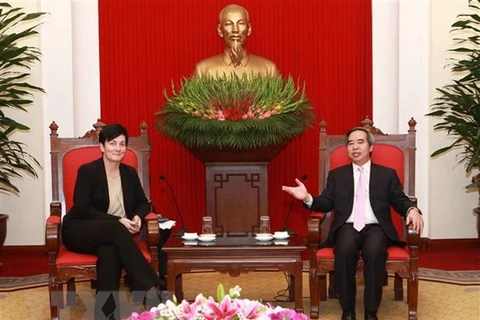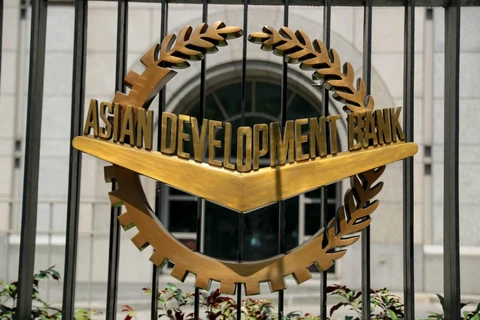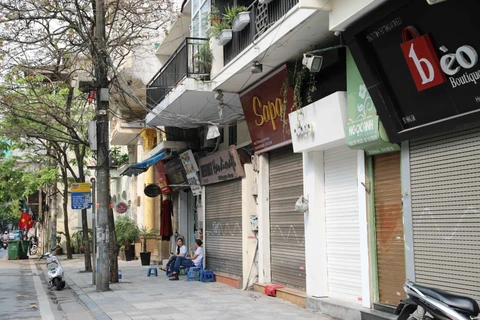Hanoi (VNA) – The foundation of Vietnam’s economy is forecast to be maintained and recover with a growth rate of 6.8 percent in 2021, providing the COVID-19 pandemic is brought under control in the first half of 2020, according to the Asian Development Bank (ADB).
ADB released the Asian Development Outlook (ADO) 2020 report, which forecasts that Vietnam’s economic growth will be hit by a sharp decline this year, falling to 4.8 percent. This is due to the initial supply shock from the impact of COVID-19 and the ongoing drop in demand from Vietnam’s principle trade and investment partners.
“Despite the deceleration in economic activity and the downside risks posed by the COVID-19 pandemic, Vietnam’s economic growth is projected to remain one of the highest in Southeast Asia,” said ADB Country Director for Vietnam Eric Sidgwick.
According to ADB experts’ analysis, economic growth has decelerated to 3.8 percent in the first quarter of 2020, down from 6.8 percent in the corresponding period in 2019.
Travel and other restrictions imposed by the government to slow the spread of the virus have led to lower domestic consumption. Manufacturing managed to weather the headwinds early on, but the inventory of inputs, including those part of global value chains, are being depleted. Growth in agriculture stagnated due to lower demand for agricultural exports and severe salinity intrusion in the Mekong Delta. Growth in services, the sector hardest hit by the pandemic, was halved to 3.2 percent in the first quarter of 2020, down from 6.5 percent in the corresponding period in 2019.
Inflation in March went down by 0.7 percent compared to February, but the average inflation in the first quarter rose to 5.6 percent, the highest it has been in the same period in 2016-2020, mainly due to health services and pork price hikes. For the whole of 2020, average inflation is expected to be 3.3 percent, continuing to increase to 3.5 percent by 2021.
If the pandemic becomes worse than the current forecast, and if the pork prices continue to increase, the inflation pressure could rise, according to ADB.
In addition, stagnant production and business activities have significantly reduced credit demand. At the end of February, credit growth was estimated to increase by 0.1 percent compared to the end of 2019, the lowest level in the same period in six years.
In order to support the affected businesses, on March 4, the Government unveiled a 10.8 billion USD credit relief package of debt restructuring and lowered interest rates and fees. The government also launched a fiscal package worth 1.3 billion USD that reduces taxes and fees for affected firms and defers tax payment. The fiscal support is also expected to rise. In addition, the central bank cut policy rates by 0.5 percent to 1.0 percent, lowered interest rate caps on dong deposits of less than six months and on short-term dong lending to prioritised sectors.
According to ADB experts, the budget deficit target of 3.4 percent of GDP for 2020 may be difficult to achieve, as tax revenues from incomes and exports have decreased, while health spending and worker support funds have increased.
Therefore, the budget deficit is forecast to increase to 4.2 percent of GDP by 2020 before improving to 3.5 percent by 2021.
ADB experts said, however, that the foundation of Vietnam’s economy should be maintained providing the pandemic is curbed in the first half of 2020. The country’s economy will recover with the annual growth of 6.8 percent in 2021, as forecast by ADB before COVID-19, and continue thriving in the long run.
Drivers of economic growth - a growing middle class and a dynamic private sector - remain robust. The country’s business environment continues to improve. Public spending to combat the impact of the pandemic, which rose significantly in January and February, will likely be raised further. The large number of bilateral and multilateral trade agreements that Vietnam participates in, which promise improved market access, will help the country’s economic rebound.
According to the bank, Vietnam would also benefit from the containment of the COVID-19 pandemic and eventual return of economic growth in China, which would help revive the global value chains./.

























